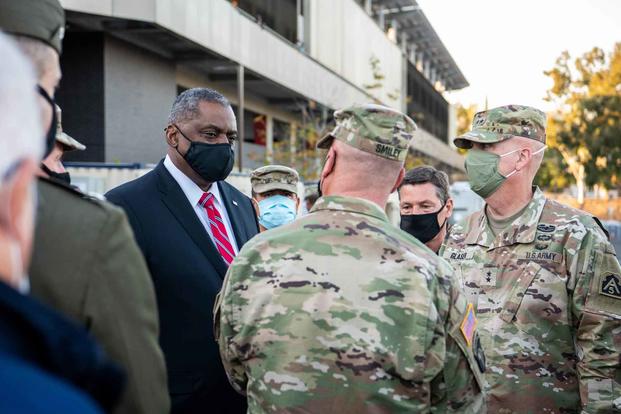The Pentagon has not yet decided whether to require service members to get inoculated against COVID-19, once the Food and Drug Administration grants full approval for the vaccines.
But in a briefing with reporters Monday, Pentagon Press Secretary John Kirby indicated full FDA approval could change how the military's leadership looks at this issue.
"Obviously, we're thinking about what happens when they become FDA-approved," Kirby said. "It would change the character of the decision-making process, about whether they could be mandatory or voluntary. But I don't want to get ahead of that process right now."
Read Next: Army's Top NCO Goes on Twitter to Scold Leaders for Not Testing Units on ACFT
Despite the popular belief that the Pentagon can inject troops with anything it wants, military leaders are unable to force service members to get the COVID vaccinations at this time because the shots are approved only under an emergency-use authorization. Troops deploying to Iraq and Afghanistan were required to get a series of shots against anthrax, but that inoculation was fully approved by the FDA.
Navy leaders have already openly discussed their desire to make the vaccine mandatory. Last month, Vice Adm. Andrew Lewis, commander of the U.S. Second Fleet, told reporters that the Navy is "probably going to make it mandatory as soon as we can, just like we do with the flu vaccine."
And the Navy has given ships the OK to relax strict coronavirus rules if all crew members get vaccinated, including eliminating weeks of pre-deployment quarantining, enforced social distancing, and restrictions on port calls and other breaks.
Nearly one-third of troops have turned down the vaccine, Pentagon officials told lawmakers last month, which has raised concerns.
Defense Secretary Lloyd Austin addressed some troops' reluctance to get the shots last week while touring a mass vaccination site in Los Angeles. He acknowledged that some Americans -- particularly minority Americans -- are hesitant to receive the vaccine because of past mistreatment by the medical community.
In one particularly notorious case now known as the Tuskegee Experiment, doctors let syphilis go untreated in hundreds of Alabama Black men for decades while they studied the disease's effects. This legacy has, in some cases, left people wary of the medical establishment and new treatments like the COVID vaccine.
"Because of some things that have happened in the past, there's a degree of mistrust, and I think we have to collectively work hard to dispel rumors and to provide facts to people," Austin said. "It's been my experience that when armed with the facts, people will tend to make the right decisions."
Kirby said a lot of factors go into whether someone chooses to get the vaccine, such as whether they have pre-existing conditions that would make vaccination risky.
He said the Pentagon is administering the Moderna and Pfizer-BioNTech two-dose vaccines almost as quickly as it gets them. So far, the military has acquired nearly 1,276,000 doses, and given almost 1,145,000 shots. About 735,000 of the shots were initial doses, and 409,000 were second doses.
"They're not staying on the shelf very long," Kirby said. "We get them, and we put them into arms."
The Pentagon will continue to make COVID vaccines available to troops who are most in need of them, including those getting ready to deploy, he said.
And while getting vaccinated is a personal decision, Kirby said troops need to remember it's also a choice that could affect their teammates' health and unit readiness.
The newly approved Johnson & Johnson vaccine, which requires only one dose and can be kept at a standard refrigeration temperature, will give the Pentagon more flexibility to vaccinate more deployed and deploying troops. Kirby said the military will start receiving shipments of the Johnson & Johnson vaccine in the next week or so.
While the military still doesn't require the vaccine for deploying troops, Kirby said it makes it available to them if they want it.
"Part of our obligation here ... is to provide enough information so they can make the most informed decision," he said. "We certainly hope that people will see that these are safe and effective, and the side effects are minimal, and that their colleagues and teammates are vaccinating themselves."
When asked whether a deploying unit might decide to leave those who decline to be vaccinated behind, Kirby declined to speculate and said that would be the unit commander's decision.
But he said he was not aware of any deploying units where this has been an issue.
The Pentagon later said in an email to reporters that 4,843 active-duty service members are supporting FEMA’s COVID vaccination centers, helping provide anywhere from 250 to 6,000 shots per day depending on the size of the center.
Teams from across the military are already deployed to California, New Jersey, Texas, New York, and the Virgin Islands, and more will soon arrive at sites in Pennsylvania, Florida, Illinois and North Carolina.
-- Stephen Losey can be reached at stephen.losey@military.com. Follow him on Twitter @StephenLosey.
Related: Almost One-Third of US Troops Are Refusing COVID Vaccines, Officials Say












